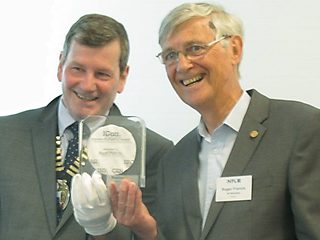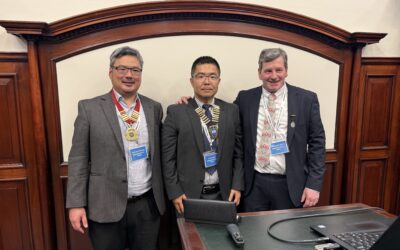Corrosion Engineering Division
Roger Francis:
Paul McIntyre Award Winner, 2023
The winner of the 2023 Paul McIntyre Award was Dr. Roger Francis and presented at this year’s Corrosion Engineering Division’s (CED) Working Day and Symposium held at the National Physical Laboratory (NPL) in Teddington on 27th April 2023. Further details of this Event may be found in the May/June issue of Corrosion Management.

Roger is a well-established Corrosion Engineer with a specialist interest in copper and its alloys and in CRAs. He has been very active in Marine Corrosion (MFC) Forums and the European Federation of Corrosion (EFC) working parties, particularly in developing standards throughout his career making him a very well qualified recipient of this award. Roger gave a brief paean to Paul in which he talked about their collaboration in standards work back in the 80s and 90s.
Rogers Background in His Own Words:
“After leaving Manchester University with a fresh PhD from the Metallurgy Department of Manchester University, I started as a very junior research scientist at BNF Metals Technology Centre (nothing to do with BNFL). I was very lucky to be working for two scientists with international reputations, Hector Campbell and Vic Lucey. They taught me a lot and introduced me to colleagues from all over the world. I was mostly working on marine corrosion
and other corrosion problems with copper alloys, particularly heat exchangers and pumps, although we got involved with other alloys. In the 1980’s I started testing of the new high alloy stainless steel in seawater. After 17 years at BNF I was head of the corrosion and protection department and looking for a new challenge.
I took up a post with the Weir Group in Manchester, evaluating the corrosion resistance of their new super duplex alloy ZERON 100. In addition, I found myself working with the pump group on failure analysis and selecting materials for pumps for aggressive environments of all sorts. I also found my services being requested by other parts of the Weir Group, such as desalination and materials handling, to look at failures and select materials. This involved a lot of foreign travel, which I enjoyed, and it enabled me to meet engineers from all over the globe. I am still in touch with some of these today.
One of the advantages of duplex stainless steels is their versatility, and I was always being asked to test duplex alloys in unusual and aggressive environments. These included flue gas desulphurisation (FGD), seawater reverse osmosis (SWRO) desalination, acid-leach mining, and hot concentrated sulphuric acid. Super duplex stainless steel performed well in these environments, and the test data was accepted to justify its use, such that it is now the standard alloy for some of these applications.
In 2008 Weir sold the Manchester operation to Rolled Alloys and I found myself spending even more time travelling and supporting worldwide sales. I was also continuing corrosion testing in aggressive environments, and evaluating new alloys, such as lean duplex. Finally in 2012 I retired and set up my own consulting business RF Materials. After the initial launch I have never advertised, as work seems to come in all the time. This is mostly failure analysis or materials selection.
While working at BNF, I was a member of the IOM Corrosion Committee, along with Paul McIntyre. Together, we organised a series of one day seminars on various aspects of localised corrosion. I enjoyed working with Paul, with his perpetual politeness and dry sense of humour. He encouraged me to get involved in EFC activities, which I did when working for Weir, in both the marine and oil and gas working parties. For the EFC I jointly edited, with Carol Powell, a basic guide to metallic corrosion in marine environments, for young engineers, and it continues to sell well. In the oil and gas working party I attended numerous meetings when we were writing EFC 17 (the use of CRA’s in sour environments), and I drafted some of the sub-sections. This document is still widely referenced today despite being over 20 years old.
In other standards work I was consulted on the update of ISO 6509 (testing for resistance to dezincification). I was also heavily involved in the development of ISO 15156 part 3 (CRA) from NACE MR0175 (The limits of use of metals in sour environments). This was a complicated exercise, because of the desire to list alloys in groups rather than individually, as in the NACE document. I was also vice chair of the NACE International (now AMPP) committee in charge of TM 0198 (SSRT) from 2013 to 2019, when we included improved practices and methods of data analysis, many of which have subsequently been adopted into ISO 7539-7.
In the 1990’s, I realised I had learned a lot from senior engineers, but they had rarely put their knowledge and experiences in to print. I decided that I would try to record some of my useful experiences and knowledge for junior engineers. My first book, on galvanic corrosion, appeared in 2001 and continues to be a NACE International best seller over 20 years later. I have written five other books on a range of corrosion topics, and a sixth is in production, all published by NACE International. I have co-written two other books, one for MTI with Dale McIntyre on stress corrosion cracking and its prevention in the chemical and process industries. In 2014, I was awarded the T J Hull prize by NACE International for my work in publications. I continue to give technical presentations, seminars and training sessions, many aimed at younger engineers, some of these under the auspices of the Nickel Institute. An example is the use of stainless steels in the UK water industry, which I have done for the past three years for the Nickel Institute.
One rewarding factor is the number of younger engineers who have come up to me at conferences and said how useful they find one of my books. A disappointing side is the number of failures I am asked to investigate that are due to poor materials selection, when the knowledge of the correct alloys has been available for decades. A good example is the misguided use of 2205 duplex stainless steel in seawater, and the surprise when it suffers crevice corrosion. Because of things like this I realise that I will need to go on lecturing about materials selection for quite a bit longer.”
Clearly, Roger has had a very impressive career and is a worthy winner for the Paul McIntyre award.
If you know a colleague who fills the criteria for the Paul McIntyre award, then please send their name, email, and justification for being nominated to
danny.burkle@lbbcbaskerville.co.uk
You can find more information on the assessment criteria here:

CAPTION:
Stephen Tate (ICorr President), with Roger Francis (Paul McIntyre Award Winner).



